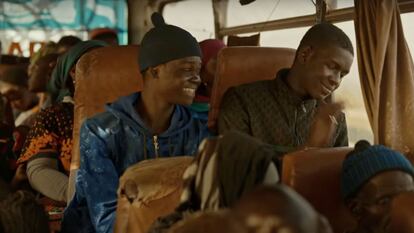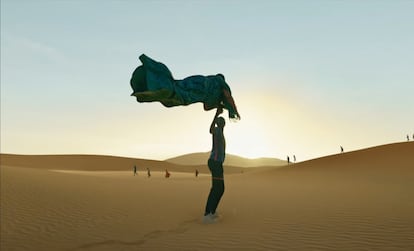Matteo Garrone’s movie ‘Me Captain’ offers an anatomy of youth immigration from Africa to the European dream
The Italian filmmaker, who directed ‘Gomorra,’ now tackles a dramatic migration story in a movie that has already won the Silver Lion for best director at Venice and is now seeking to claim an Oscar

Since 2014, over 28,500 people have died in the Mediterranean Sea trying to reach Europe. In 2023 alone, some 2,700 have died. These deaths occurred mainly in the central area, the world’s most dangerous migratory route; according to the International Organization for Migration (IOM) Missing Migrants Project, over 22,500 deaths and disappearances happened there.
These are the human beings who had previously managed to reach the coasts of North Africa; they are the survivors of another brutal crossing, the one they previously made by land. That route never appears on the European news, which focuses instead on the watery grave, but Italian filmmaker Matteo Garrone, 55, has dedicated his latest work, Me Captain, to that land journey. It will arrive in U.S. theaters in February after already winning the Silver Lion for best director at the Venice Film Festival. The movie is also on the shortlist to represent Italy in the best international film category for the Oscars.
In 2023, several European filmmakers held up a mirror to the rest of the continent’s inhabitants so they’d see reflected back at them their racism, so that they would realize for the first time that there is a reality that they will never discover from their living room sofas, and so that they’d recognize that Europe cannot turn its back to reality, and “that even with the highest walls, entrenched in the fantasy of the welfare state, it cannot stop other human beings who don’t simply yearn to live better, but just to live,” says Garrone, who sheds light on the voyage to Italy in Me Captain. In the same vein, Agnieszka Holland, in Green Border, addresses the eastern frontier between Belarus and Poland and the macabre game being played, primarily with Syrians, while Ken Loach, in The Old Oak Tree, focuses on migrant settlements in the United Kingdom; both films force similar reflections. The trio is united by their fear of the far Right, “which has gotten further than ever in more European countries,” the Englishman says. In Italy, Giorgia Meloni’s government “enjoys total impunity,” Garrone observes. “But she is not the only one or the main culprit, we are all guilty. This project started before she won, and it does not seem like things will change while she is in power. The migration emergency has always existed; the shame will always accompany us.”

Garrone chatted with EL PAÍS in September, when his film was screened at the San Sebastian Film Festival in Spain. As usual, he talks non-stop, passionately defending his film, which blends magical realism, adventure and social commentary. Previously, he shared his view of immigration in Land in Between (Terra di mezzo; 1996) and Guests (1998), before he rose to fame with his sixth feature film, Gomorra (2008), in an adaptation of Roberto Saviano’s book. “I returned to the subject because I wanted to illustrate an injustice, the violation of the basic human right of freedom of movement. These are people forced to put their very lives at risk in order to undertake a journey, [which is] often a deadly journey. We frequently believe that desperation is born of environmental reasons, war or famine. But there is more. 70 percent of the African population is [made up of] young people who — like our own youths — pursue their dreams, tangible dreams that they are familiar with because they see them on social media, on their phones. And they do not understand why they cannot travel freely. In the face of their vigor, their vital drive to improve the lives of their families or, simply, to see the world, the walls, barriers and fences we build are useless,” Garrone reflects. “It has taken me many years to tell this story, and it was only three years ago that I discovered the key. It had to be told from their point of view, from an African perspective, not the good-hearted European bourgeois one.”
“I wouldn’t do it if I were you”
The journey of Seydou and Moussa, 16-year-old cousins and friends, begins in Dakar, where an oracle-like survivor advises them: “I wouldn’t do it if I were you.” Garrone points out the difference between shooting a documentary and a fiction film: “I want the viewer to feel the emotional journey of the main characters. That’s why we have tried to reconstruct reality with the help of the people who experienced that migration journey in the flesh.” How many sub-Saharans know that pain? “I can only tell you that 99% of the extras who participated in the film had gone through that experience, so they were eager to tell it. [It’s] a reality that they don’t even verbalize for fear that their compatriots won’t believe them. I am merely an intermediary, I put myself at the service of these people with my experience and with my vision, although I am telling their truth.”
Are there feasible solutions to put a stop to these thousands of deaths? Before leaving Libya and other North African countries on ships or small boats, thousands of people die crossing the Sahara desert, locked up in the human traffickers’ Libyan prisons, killed by the bandits with whom they cross paths. Seydou and Moussa set off from the West African coast, in a stream of migrants that soon becomes a flood. First they go east, and then they head north without ever resting or finding help. “The only way to fight injustice, to fight human trafficking, is to regularize the channels of entry and exit. To understand that we need these people, young people who, fortunately, want to work here, because our countries have aging populations, doomed to death,” he explains. “It has been difficult for me to reach this conclusion, but now I have no doubt. I have never seen a fence that has successfully stopped humans.”
Garrone came to the interview happy. Since Me Captain premiered in Italy on September 7, it has been earning more and more money each week. At that time Italy had selected the film to represent the country for the Oscars: “I just want it to be seen a lot. I just want it to be screened for free in schools, in high schools. That’s how the film connects with Pinocchio [Garrone’s previous film]: there are protagonists who flee from parental authority, there is magic, there are dream sequences. In both cases, there are even reencounters in whale bellies, real and figurative. The kids wear Barça and Madrid jerseys, like any teenager anywhere in the world. They are not statistics, they are people like us, with their own problems and dreams. If you turn them into numbers in the newspaper or create archetypes on the screen, you’ve raised yet another barrier.”
Garrone clears his throat and his tone saddens at the end: “What are the classic stories, the fairy tales, like? [They’re] stories based on horror and violence, difficult moments in which human solidarity is also born. And cautionary tales against the dangers that lie in wait. I want to see how [the film] is received in Africa; I will go to screen it wherever it is necessary. I hope to make an impression on European hearts, but [I] also [want] for sub-Saharan kids to see something they have never observed, which is that before dying at sea you can die in the desert.”
'Me Captain' (Io Capitano)
Director: Matteo Garrone.
Actors: Seydou Sarr, Moustapha Fall, Hichem Yacoubi, Issaka Sawadogo.
Genre: Drama. Italy, 2023.
Duration: 121 minutes.
Premiere: February 2024.
Sign up for our weekly newsletter to get more English-language news coverage from EL PAÍS USA Edition
Tu suscripción se está usando en otro dispositivo
¿Quieres añadir otro usuario a tu suscripción?
Si continúas leyendo en este dispositivo, no se podrá leer en el otro.
FlechaTu suscripción se está usando en otro dispositivo y solo puedes acceder a EL PAÍS desde un dispositivo a la vez.
Si quieres compartir tu cuenta, cambia tu suscripción a la modalidad Premium, así podrás añadir otro usuario. Cada uno accederá con su propia cuenta de email, lo que os permitirá personalizar vuestra experiencia en EL PAÍS.
¿Tienes una suscripción de empresa? Accede aquí para contratar más cuentas.
En el caso de no saber quién está usando tu cuenta, te recomendamos cambiar tu contraseña aquí.
Si decides continuar compartiendo tu cuenta, este mensaje se mostrará en tu dispositivo y en el de la otra persona que está usando tu cuenta de forma indefinida, afectando a tu experiencia de lectura. Puedes consultar aquí los términos y condiciones de la suscripción digital.









































